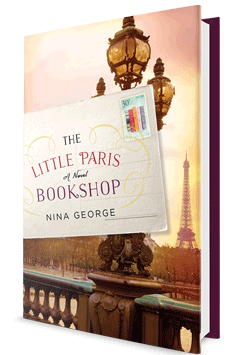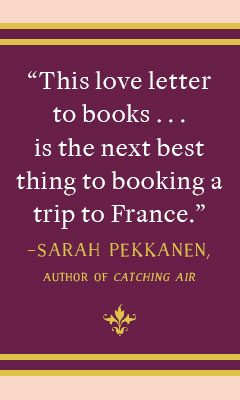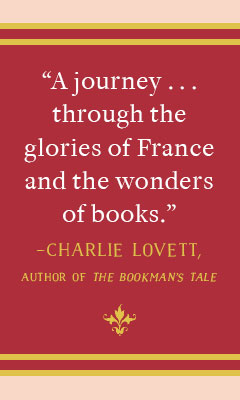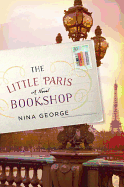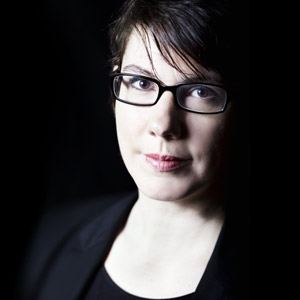The Little Paris Bookshop
by Nina George, trans. by Simon Pare
Nina George takes readers on a winding river cruise from Paris south through the French countryside in her enchanting The Little Paris Bookshop, a novel that deals with the nature of grief and the power of friendship, love and truth.
The narrative centers on Monsieur Jean Perdu, who owns a bookstore called the Literary Apothecary--actually a floating barge "the length of three truck trailers" that houses 8,000 books, moored on the River Seine. Fifty-year-old Perdu is meticulous, intuitive, melancholy--a passionate bibliophile who believes that booksellers don't just look after books, they look after people. He's proud of his ability to prescribe the perfect book to remedy "countless, undefined afflictions of the soul" for every reader who crosses his path--customers to whom he sells books on the barge, as well as his apartment neighbors at 27 Rue Montagnard. For more than 20 years, Perdu has worked hard, but has kept to himself socially, suffering from prolonged sorrow incurred when the great love of his life broke his heart.
Things take a turn when two new residents move into Rue Montagnard. Max Jordan is a young author whose debut novel has made him famous. He is hailed as "the new voice of rebellious youth." Like a rock star, Max is chronically on the run from gushing fans, namely women who "read the book to find out why men are so cruel to them." Max, plagued with writers' block, seeks the wisdom of Perdu, who prescribes him a book called Southern Lights, an obscure, unconventional story that deals with the humanity of various kinds of love. The book is Perdu's favorite, "the only balm that could ease [his] pain--a gentle, cold stream over the scorched earth of his soul." For more than two decades, Perdu has treasured the story and lingered over its beautiful passages. He longs to find and thank the author, Sanary, whose mysterious pseudonym is taken from the name of a southern French town known to be a place of refuge for exiled writers.
The other new resident of Rue Montagnard is Madame Catherine, who moves into the flat across the hall from Perdu. The tenants of the building rally to help this newly cast-off wife, "cold-heartedly ejected from her own life," who has nothing of her own to set up her new apartment. When Perdu is asked to contribute something, he wants to give her a book. But the ladies request something more practical: "A table, perhaps."
In order to fulfill their request, Perdu decides to dismantle a bookcase that's been concealing the second room in his apartment, a space closed off for more 20 years. Here is where all of Perdu's love, dreams and memories have been sealed up, along with a few scant furnishings--reminders of Manon, a woman he refers to initially only as a blank line in the text of the narrative, as even the mention of her name is too painful for Perdu. It's "a dark spot amid his feelings."
Perdu sorts through the room and delivers a table to Madame Catherine's apartment. What ensues is an instant attraction, a "communion of souls" and a sudden, unexpected intimacy, whereby the two find themselves easily sharing their feelings about their love of books, along with stories about the ghosts of their broken, wounded hearts.
When Catherine discovers that Perdu's table has a drawer painted shut and finds a letter inside, Perdu's head and heart spiral into an emotional tailspin. He recognizes the letter--Manon sent it before she vanished from his life. Perdu, in his angry despair over their break-up, threw the letter in the drawer, where it remained, unopened, for 21 years and a day.
When he finally musters the courage to open the letter, he is stunned to learn that the circumstances of Manon's departure from his life were not as he'd originally believed. In an effort to run away from painful truths, Perdu impulsively takes refuge in the Literary Apothecary, soon hauling anchor and setting sail--but not before Max, who's being pursued by paparazzi, jumps aboard the moving barge.
Together, the two men chart a course toward Avignon. Perdu longs to find out the truth about Manon and is guided by wisdom from his favorite book and author, Sanary, who said, "You have to travel south by water to find answers to your dreams... you find yourself again there, but only if you get lost on the way--completely lost. Through love. Through longing. Through fear... the soul sometimes needs to cry to be happy."
Perdu and Max navigate through dense channels, canals and marinas. The two men--frequently mistaken for father and son--are without telephones, credit cards and much cash. This strengthens their bond as they pass the time by sharing life stories. Perdu's advice and mentoring of Max in his stalled writing career actually helps Perdu to begin to reconcile his own life, especially his feelings for Manon and the love they shared. From port to port, funds run low for food and fuel, so Max uses his "rock star" status to help meet their needs. Perdu, on the other hand, starts to sell off his stock of books, continuing to recommend titles to everyone they meet. This includes a Brigadier of the French Waterway Authority, German tourists, lockkeepers, an old and exiled American author, a family entrenched in the back roads of the French countryside, a woman fished out of the Seille River in Burgundy, even a lovesick, middle-aged Neapolitan barman and passionate cook who joins Max and Perdu on their journey southward toward Sanary.
George is a lyrical writer whose beautiful, sensory language and imagery enhance this adventurous, moving narrative. Interspersed throughout are updates Perdu writes to Catherine back in Paris, along with travel diaries penned by Manon, which fill in a romantic back story. George also includes recipes and a clever compendium, a list of books from "Jean Perdu's Literary Pharmacy."
In the end, the voyage propels Perdu to finally reconnect with himself--the person he was, is and who he will become in the future. The journey shows that he is not alone in his grief and suffering; each person who crosses his path has his or her own story filled with burdens, illusions and sadness. And while it may appear that every meeting is coincidental, as the intricacies of Perdu's story unravel, the randomness begins to seem more like providence, as though we all have a part to play in other fates. In the end, human connections ultimately enlighten Perdu and offer him healing and redemption. As Perdu leaves the routine of his life for the fluidity of the river--and opens himself again to new possibilities--he is shown that interactions with other people in other places can be just as transformative as the power of books to change peoples' lives, souls and destinies. --Kathleen Gerard



